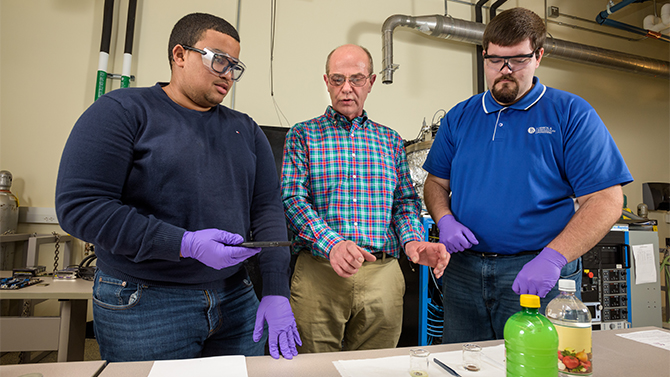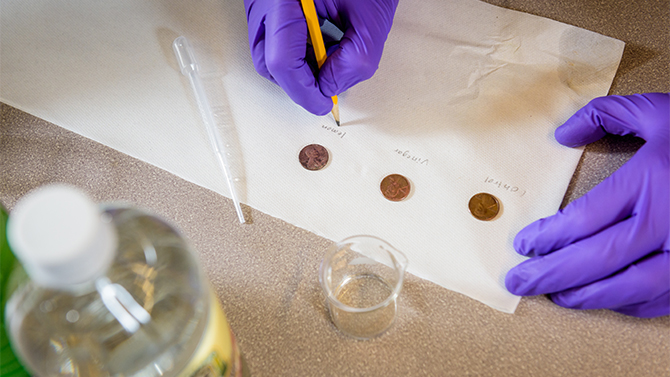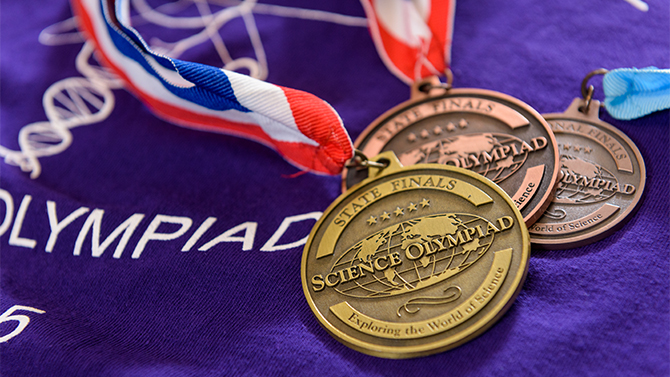

Science Olympiad
Photos by Evan Krape March 02, 2017
Scores of UD students, staff, faculty fuel premier competition
Derek Bischoff's life took a decidedly scientific turn during his sophomore year at Conrad High School in Wilmington, Delaware. He learned about a meeting for anyone interested in competing in the Delaware Science Olympiad. He decided to check it out.
He wound up on Conrad's team for the rest of his high school career – serving as captain his senior year – and won a spot as a summer intern in the laboratories of two scientists at the University of Delaware.
Now a UD sophomore majoring in chemical engineering, he and about 40 other UD students – undergrads and grads – plus many faculty and staff members will be part of Jerry Poirier's 500-volunteer brigade when the 40th annual Delaware Science Olympiad is held at Delaware State University on Saturday.
Poirier, manager of UD's Advanced Materials Characterization Lab, is director of the Delaware Science Olympiad, of which he has been a part for 20 of its 40 years.
About 900 high school competitors representing 60 high schools are expected, plus alternates, family members and other cheering sections.
Poirier needs all the help he can get, and the UD community has always responded.
"It's a lot of work," Poirier said, "but the Science Olympiad is a premier extracurricular activity."
Winners advance to the national competition, which this year will be held at Wright State University in Dayton, Ohio. Valuable prizes, including scholarships, trips and gear, are in the mix.
The Delaware Science Olympiad competition was one of the first in the nation, launched in 1977 by longtime science educator John C. (Jack) Cairns. Its success sparked national expansion and the first national championship was held in 1985.
In addition to the high school competition on Saturday, a middle school competition will be held at Delaware State on March 25 and an elementary-level event will be hosted by Wilmington University on May 6.
With more than 20 events spread throughout the Delaware State campus in Dover, the daylong competition is like a massive science-themed track meet. There are “build” challenges, where teams construct such things as robotic devices, bottle rockets and electric vehicles, and there are written tests and lab events, with a wide range of topics including astronomy, ecology, microbes, meteorology, chemistry, materials science, optics, food science, geology and wind power, to name a few.
This is how scientists are built – with questions, experiments, problems to solve, gadgets to build, exploration, research, testing, critical thinking, careful observation, analysis, errors, failures and resilience.
Bischoff might make a case for genetics, too. His grandfather, the late Kenneth Bischoff, was on UD's faculty for more than 20 years and chaired the chemical engineering department during his distinguished tenure.
Bischoff has the textbooks his grandfather wrote. Kenneth Bischoff's name is on the wall of honored engineers at the entrance of DuPont Hall and still remembered in Colburn Lab, where records show his office was in Room 331.
But Bischoff was only a year old in 1997 when his grandfather retired from UD's faculty and he was only 10 when his grandfather died. He had never been in a laboratory and didn't really know what it would be like to be a scientist until his dad, Jim, took him to that first Science Olympiad and it all started to click.
He won a gold medal at the Science Olympiad in his junior year at Conrad and that meant he could get a summer internship at UD. He worked with Poirier in the morning and with Juejun Hu, a professor now at MIT, in the afternoon.
"As a high school student, a lot of details went over my head," Bischoff said. "But that really started my inspiration."
Saturday, he and two other students – Maura Koehle, working on her doctorate in chemical engineering at UD, and Jeremiah Batista of Delaware Technical Community College – will run the "Experimental Design" event that requires teams to develop an experiment based on materials they are given. What could you learn from a few pennies, a bit of vinegar and some lemon juice, for example?
Students have about 50 minutes to come up with an idea and write a report on their processes, errors, results, conclusions and what they might do next. Bischoff, Koehle and Batista then will evaluate their work and submit their own reports.
Batista said competing in the Science Olympiad helped him to narrow his scientific interests. In his first year, he competed in cell biology, rocks and minerals and the circuit lab. In subsequent years, he explored other aspects of science. Now, at Delaware Tech, his studies focus on computer engineering.
"The Science Olympiad helped me see what I wanted to do," he said.
UD is one of about 10 sponsors of the event. Others include Iron Hill Museum, W.L. Gore and Associates, the Delaware Environmental Institute, Air Liquide, DuPont and the Delaware Nature Society.
Contact Us
Have a UDaily story idea?
Contact us at ocm@udel.edu
Members of the press
Contact us at 302-831-NEWS or visit the Media Relations website




